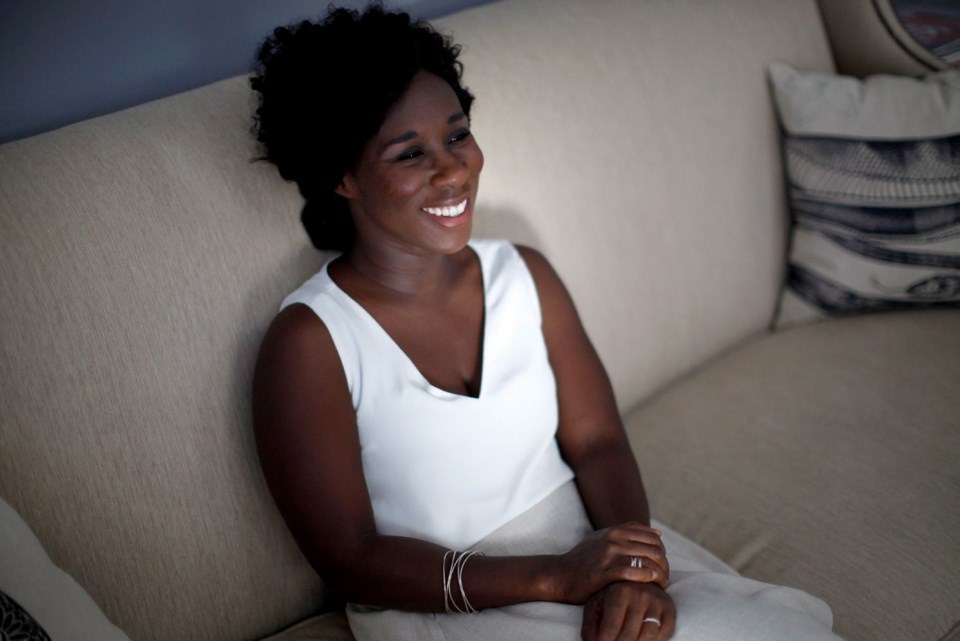Esi Edugyan earned some well-deserved down time after her breakout novel, 2011’s Half-Blood Blues, made her a literary star. But the Colwood-based author saw precious little of it during the long lead-up to her latest novel, Washington Black.
Edugyan has two children, now ages seven and three, with fellow author and University of Victoria writing instructor Steven Price, which meant she needed to become a scheduling pro to balance her personal and professional lives. Edugyan also travelled internationally for writing residencies and served on the jury for the Scotiabank Giller Prize, which required months of attention.
She eventually found a rhythm. Near the end of the writing process for Washington Black, which arrived in stores Tuesday, the Calgary-born writer started putting in time at The Broken Paddle, a busy coffee shop in the Metchosin village. She often sat with her laptop, headphones on, at what became her favourite table, and finished what is expected to become one of the best-reviewed books in Canada this year.
It was three years of fairly solid writing to bring Washington Black to life, according to Edugyan. Writing can be slow going, no matter the age of the author or their level of experience. Edugyan wrote her first novel, The Second Life of Samuel Tyne, when she was just 24.
“When I’m starting a book, there’s no way I’m going to do even two pages a day,” Edugyan said, chatting over coffee at The Broken Paddle, one table removed from where she wrote parts of Washington Black. “If I get a paragraph, that’s fantastic. Towards the end of the book, you’re just sprinting.”
Edugyan used every bit of the seven years between books to refocus after the rollercoaster reception to Half-Blood Blues. Her second novel won the Scotiabank Giller Prize, the top literary prize in Canada, and drew nominations for the Man Booker Prize, the Governor General’s Awards, Orange Prize for Fiction and Rogers Writers’ Trust Fiction Prize. The enduring popularity of the book has set the stage for another triumph with Washington Black, which she turned in to her publisher in June.
In July, it scored a longlist nomination for this year’s Man Booker Prize, one of the top literary awards in the world.
“I’ve been trying to relax, but it’s hard,” Edugyan said. “So I started writing another book.”
Edugyan politely declined when asked to reveal details about her new project, other than to say the writing has been slow. “I’m struggling to get rid of George Washington Black’s voice. It’s still there.”
That is a recurring problem for Edugyan, who tried for months to shake the grip of Half-Blood Blues, the story of jazz musicians spread over several decades that was anchored by a central character, bassist Sid Griffiths, whose unique rhythm and Baltimore language haunted Edugyan for years. “I think that’s why there was such a big gap between books.”
When she started writing Washington Black, Edugyan found that her newest Zelig-like character, an 11-year-old slave named George Washington Black, also needed his own voice.
“Part of what I needed to do was de-program myself from writing in the voice of Sid. Every character comes with their own fully-realized voice, but there was a shifting of gears in terms of the cadences — they were different eras — and different manner of speech. Sid is very expressive and his thoughts are very blunt. Washington was very different, he was very retiring, and somebody who, at the beginning of the book, doesn’t have a strong sense of self.”
Washington Black’s story of a field slave whose adventures take him from England to the Caribbean and the Arctic, among other locales, finds its titular character — having suffered great physical harm during his childhood — struggling with the issue of identity. Edugyan, the daughter of Ghanaian immigrants, came to Victoria in the mid-1990s searching for hers. “It was the first time I’d ever been on a plane,” she said of the flight from Calgary that brought her to UVic, from which she received a writing degree in 1999. “It was amazing.”
Edugyan’s storybook journey in the time since has been nothing short of sensational. The film rights to Half-Blood Blues were optioned six months ago by a German movie producer, an ironic twist given the initial reception to the book — which was muted, to say the least. “It was rejected universally,” Edugyan said of her attempts to get Half-Blood Blues published.
“I knew that if [Half-Blood Blues] was going to sit in a drawer, then I was done.”
She has seemingly created a niche of her own (Edugyan has called herself a “historical novelist”), and each of her three books — which collectively span several decades, from the 1830s through the 1920s to the 1990s — reinforce that point.
“I like finding historical footnotes, things nobody was written big books about. For Samuel Tyne, I had not realized there had been these black townships at the turn of the 20th century in Alberta. It starts from wanting to know more about something I haven’t heard much about.”
Another thread connecting her books is the manner in which they all scroll back in time. That may change, Edugyan said. Her new book will be rooted in the present tense.
“Every book asks for its own structure. Every book will tell you what it needs at some point. It’s so difficult to write about today, everything is so crazy and ever-shifting. Choosing past stories that reflect on the present — you can do it in what feels like a more complete way.”



